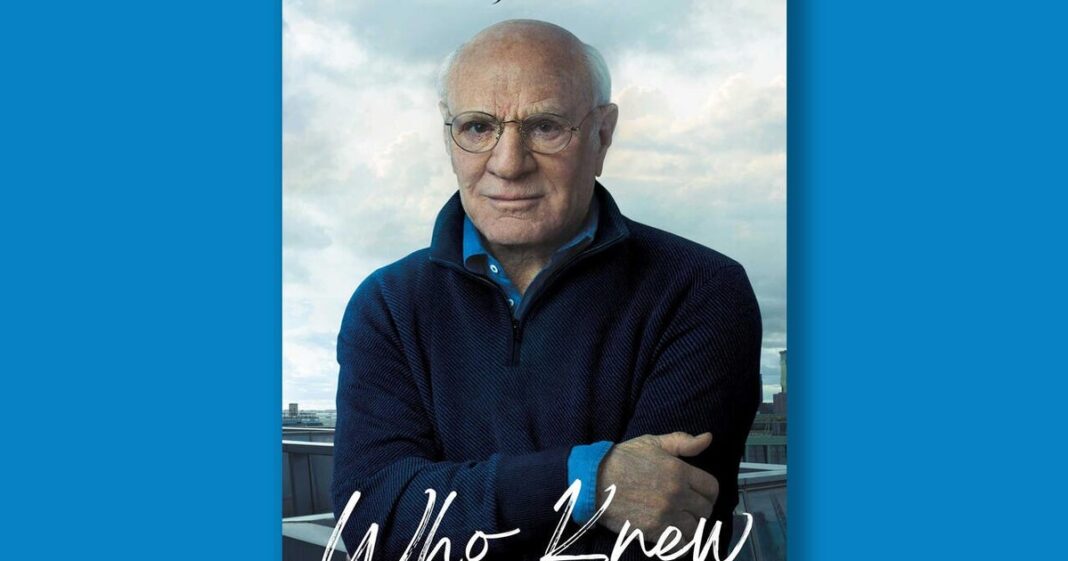Simon & Schuster
We may receive an affiliate commission from anything you buy from this article.
TV, film and media executive Barry Diller spent a decade at ABC, where he helped popularize the made-for-TV “Movie of the Week.” In his new memoir, “Who Knew” (to be published on May 20 by Simon & Schuster), Diller writes about his career, including a lesson about the limitations of too much information – when instinct (for, like, what makes an intriguing Movie of the Week?) may be a better predictor of success.
Read an excerpt below, and don’t miss Tracy Smith’s interview with Barry Diller on “CBS Sunday Morning” May 11!
“Who Knew” by Barry Diller
Prefer to listen? Audible has a 30-day free trial available right now.
We were good on titles in the early days
Women in Chains was one of my favorites; it was a horrible movie, but what a promotable title.
Scream, Pretty Peggy wasn’t bad, either.
Sometimes the staff would ask, “Is it commercial?” and I would brutalize them, because rather than using their instincts, they were trying to predict the public’s appetite, which I said then and say now, over and over again, simply isn’t possible. Neither is using research to help make decisions. No amount of research on ideas is worth the paper (or computer screen) it’s printed on. Data can tell you what has happened, not what can or will happen. Data is often harmful to instinct, and I believe this to be true for making not only creative decisions but many business decisions. PowerPoint can be the enemy; structured information often narrows the sieve just when you need to broaden it out in the spaces between information and real understanding. Overtraining our brains on data alone doesn’t confer an advantage, and it can be a deterrent if it’s the only decision-making component. That’s often the problem with MBA students, who come armed with all the business tools and case studies but little simple human instinct. I do not believe that using instinct rather than deep, hard numerical or fact-based data to help with decision-making is the lazier process. Too much information can overload, overcomplicate, and obscure what is at the essence of any proposal: Is it a good idea, and does it make any common sense?
You rarely get the perfect project or the perfect script. In all my experience I probably haven’t read ten scripts out of a thousand that are so fully realized, so utterly and incontrovertibly great that you just scream, “Make it!” One of those, though, was the day in 1970 that Leonard Goldberg, who had recently moved on from ABC to run a large television production company, called up and said, “You must read this script right now.” It was called Brian’s Song, the story of the deep bond between a Black and a white pro football player, one who will die of cancer. I wept as I read it. I called him up and said, “We can only screw it up from here—it’s perfect—let’s go.” Often referred to as one of the finest television films ever made—and one of the greatest sports films as well—it was nominated for nine Emmys and won five. Another of those few times, Dan Curtis, a leading ABC daytime producer, sent me a manuscript of an as-yet-unpublished novel called The Kolchak Papers. I read it in two or three hours—it was the contemporary tale of a vampire in Las Vegas—and I told Dan, “This is as good a story as I’ve ever read.” And what a great idea: Las Vegas, a city most alive at night—the perfect place for a vampire to live.
Out of that novel we made The Night Stalker, which turned out to be so good that we held a screening for the senior ABC management, who all said, “That’s a great movie. We should release it theatrically!” I fought against that, saying, “Yes, it’s a great movie, but it’s a Movie of the Week, and that’s where it belongs.” We aired the film in early January 1972, and it became ABC’s highest-rated Movie of the Week, drawing about 50 million people, a record. The Night Stalker spawned a sequel (The Night Strangler) and a television series (Kolchak: The Night Stalker), and it was followed by two more made-for-TV movies and a subsequent remake of the series. All that from one good idea!
From “Who Knew” by Barry Diller. Copyright © 2025 by Barry Diller. Excerpted with permission by Simon & Schuster, a division of Simon & Schuster, Inc.
Get the book here:
“Who Knew” by Barry Diller
Buy locally from Bookshop.org
For more info:
- “Who Knew” by Barry Diller (Simon & Schuster), in Hardcover, eBook and Audio formats, available May 20


